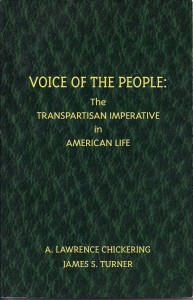 Conversational Book, Valuable, August 25, 2008
Conversational Book, Valuable, August 25, 2008
A. Lawrence Chickering and James S. Turner
My substantive review, which is very favorable, follows the Table of Contents that I am entering here because the publisher failed to do so using the tools that Amazon provides.
Part I: The Crisis in Our Politics: Partisan Fatigue
Chapter 1: What Divide? Our Phantom Political Conflicts
* The Divided America Myth
* The Transpartisan Majority: A Different America
* Language: Partly a Problem of Words
Chapter 2: Some Casualties of Partisan Politics: Prisons, Schools, Hospitals, and National Security
* Prisons and the Penal System
* Public Schools: A `Rising Tide of Mediocrity'
* The Healthcare System
* National Security
* Bringing Citizens into Public Spaces
*
Part II: The Old Politics: Squeezing the Life Out of Society
Chapter 3: Transpartisan Capitalism I
* Private interest and Public good
* Ownership in Public Spaces
Chapter 4: National Security and “The Long War”
* Improved Law Enforcement and the Recruitment of Citizens
* Spending for Security
Chapter 5: Challenges of an Unconnected Society: Race, Sexual Preference, and Religion
* Rethinking the Relationships
* Race
* Gender and Sexual Preference
* Religion/Spirituality
Part III: The Transpartisan Imperative
Chapter 6: A Call to Action: The Transpartisan Opportunity
* Addressing the Nature of Life: Nasty, Brutish, and Short
* The Founding
* Forming a More Perfect Union
* The Structure: Congress Shall Make No Law
* The Transpartisan Context: We are all Republicans We are all Federalists
* Transpartisan Discourse
Part IV: Transpartisan Politics: Bring Life Back to Society and Society Back to Life
Chapter 7: Transpartisan Capitalism II
* Public Schools and the Challenge of Bureaucracy
* Notes on a Political Strategy
* The Energy/Environment Challenge
* What is Politically Feasible
* Who will Decide What to Do on Climate Change?
Chapter 8: Recruiting Citizens as Partners for National Security and Foreign Policy
* Focusing on Social Trust
* A Foreign Policy Model
* Spending for Security
Chapter 9: Re-engaging Society: Race, Gays, Religion, and Spirituality
* Race
* Gender and Sexual Preference
* Religion and Spirituality
Part V: Leadership for a New American Politics
Chapter 10: Transpartisan: Past, Present, and Future
* Transpartisan Integration: Engaging Left and Right
* Expand the Analysis
* Transforming Taxes: A Transpartisan Discussion
* Expanding the Business/Commercial Context
* Synergizing Religion
* Empowering the American Transpartisan Imperative
Chapter ii: An Awakened America
* The Changing Role of Leadership: Repairing the Structure of Partisan Politics
* The Paradox of Political Change
* Active Citizenship Organizing Transpartisan Political Campaigns
Conclusion: Leadership for a New Politics
* Starting a Conversation
MY REVIEW
Jim Turner, the liberal co-author, shares with Don Beck, author of
Spiral Dynamics : Mastering Values, Leadership, and Change (Developmental Management), the conceptualization of the word “transpartisanship,” a word that is a direct contradiction of the word “bi-partisan,” the latter being code for “keep the two-party spoils system immune from public challenge.” See Peter Peterson's Running on Empty: How the Democratic and Republican Parties Are Bankrupting Our Future and What Americans Can Do About It.
A. Lawrence Chickering, the conservative co-author, wrote Beyond Left and Right: Breaking the Political Stalemate, a concept that has gained great popularity, in part because of Paul Ray's superb work on “The New Political Compass” (not yet a book, free online).
Both authors credit Dee Hock with his pioneer role in One from Many: VISA and the Rise of Chaordic Organization.
I rate this superb book at four stars and a “must read.” The authors and the publisher lose one star for failing to offer the book in a scalable manner, and for presenting a mish-mash of policy assertions with little reference to either the actual threats to our society or to the actual budget (e.g. 950 billion for the military and 30 billion for diplomacy, in 2007).
This is a hugely important book and a must read. It is not available free online, which is a pity because the book *should* be read by millions before Election Day 2008.
I went through my copy today (I traded Jim Turner a copy of Collective Intelligence: Creating a Prosperous World at Peace) and here are the critical points that grabbed me:
+ “Old (partisan) politics squeezes the public out of politics.
+ Transpartisan capitalism (not to be confused with Natural Capitalism: Creating the Next Industrial Revolution) creates a valuable new concept that melds private interests and public good.
+ National security is broken, in part because the US “system” is optimized for state to state relations, for “hard power” from the military, at a time when we need to distinguish between–and deal differently with–strong versus weak states, and weak states versus their societies (often fragmented ethnically, tribally, and by religion).
+ Restoring local ownership is a key principal in energizing change. I personally support “home rule” and the reasonable demand that corporations forego their illicit use of “personality” to avoid liability.
+ The authors present the need for an informal network for deciding upon and then delivering foreign assistance that is separated from US “policy” and not necessarily funded by the taxpayer.
+ The authors quietly present the alternative to individual income taxes, crediting economic professor Edgar Feige with the idea of an automatic banking transaction tax.
+ The authors call for changing the debate from left-right to a four quarters matrix (see Paul Ray's work for a more sophisticated depiction) and for creating new means (not further defined) for engaging all of us in participatory democracy. [The most obvious need is for all budgets to be online and open to the public prior to being voted on by Congress or other bodies, and for the elimination of all secret earmarks.]
The book ends with a disappointingly out of date list of founding members of Reuniting America, 110 million strong, and a handful of organizations including 25 representing the “radical center.”
See also:
The Cultural Creatives: How 50 Million People Are Changing the World
Blessed Unrest: How the Largest Social Movement in History Is Restoring Grace, Justice, and Beauty to the World
Society's Breakthrough!: Releasing Essential Wisdom and Virtue in All the People
See also my own political book, free online as well as for sale as a high end full color version, Election 2008: Lipstick on the Pig (Substance of Governance; Legitimate Grievances; Candidates on the Issues; Balanced Budget 101; Call to Arms: Fund We Not Them; Annotated Bibliography). There is no connection between the two books or the authors of that book and my own personal “shout out” against the corruption that is so evidently on display in Washington regardless of which party controls the Congress or the White House. “Bi-partisan” is code for betraying We the People and giving trillions of our hard-earned credit to Wall Street speculators that bribed Congress to look the other way as they destroyed the American economy.
 For all those who have missed the Rethinking Economics conference held in London this summer, and those of you who came but want a refresher on the need for radical change in the economics curriculum, Lord Adair Turner's opening keynote speech is now online. Click below to watch and stay tuned for more videos!
For all those who have missed the Rethinking Economics conference held in London this summer, and those of you who came but want a refresher on the need for radical change in the economics curriculum, Lord Adair Turner's opening keynote speech is now online. Click below to watch and stay tuned for more videos!






